Project Management Methodologies: Everything You Need to Know
VerifiedAdded on 2023/04/22
|9
|2162
|185
AI Summary
This article discusses various project management methodologies such as Waterfall, Agile, Hybrid, Scrum, PRiSM, and PRINCE2. It also highlights the advantages and disadvantages of each methodology. The article further discusses ways to choose the right methodology based on project evaluation, team evaluation, organization evaluation, and stakeholder evaluation.
Contribute Materials
Your contribution can guide someone’s learning journey. Share your
documents today.
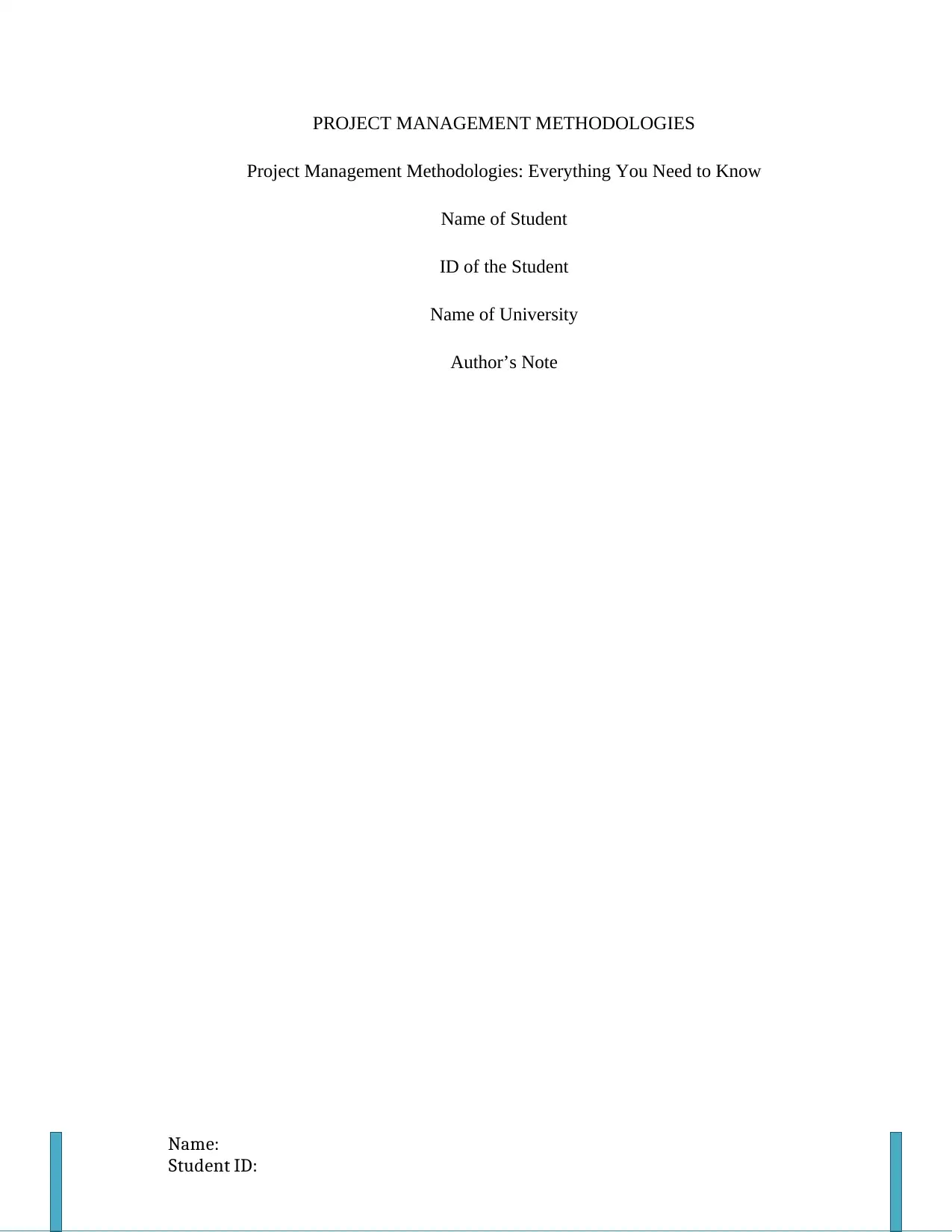
PROJECT MANAGEMENT METHODOLOGIES
Project Management Methodologies: Everything You Need to Know
Name of Student
ID of the Student
Name of University
Author’s Note
Name:
Student ID:
Project Management Methodologies: Everything You Need to Know
Name of Student
ID of the Student
Name of University
Author’s Note
Name:
Student ID:
Secure Best Marks with AI Grader
Need help grading? Try our AI Grader for instant feedback on your assignments.
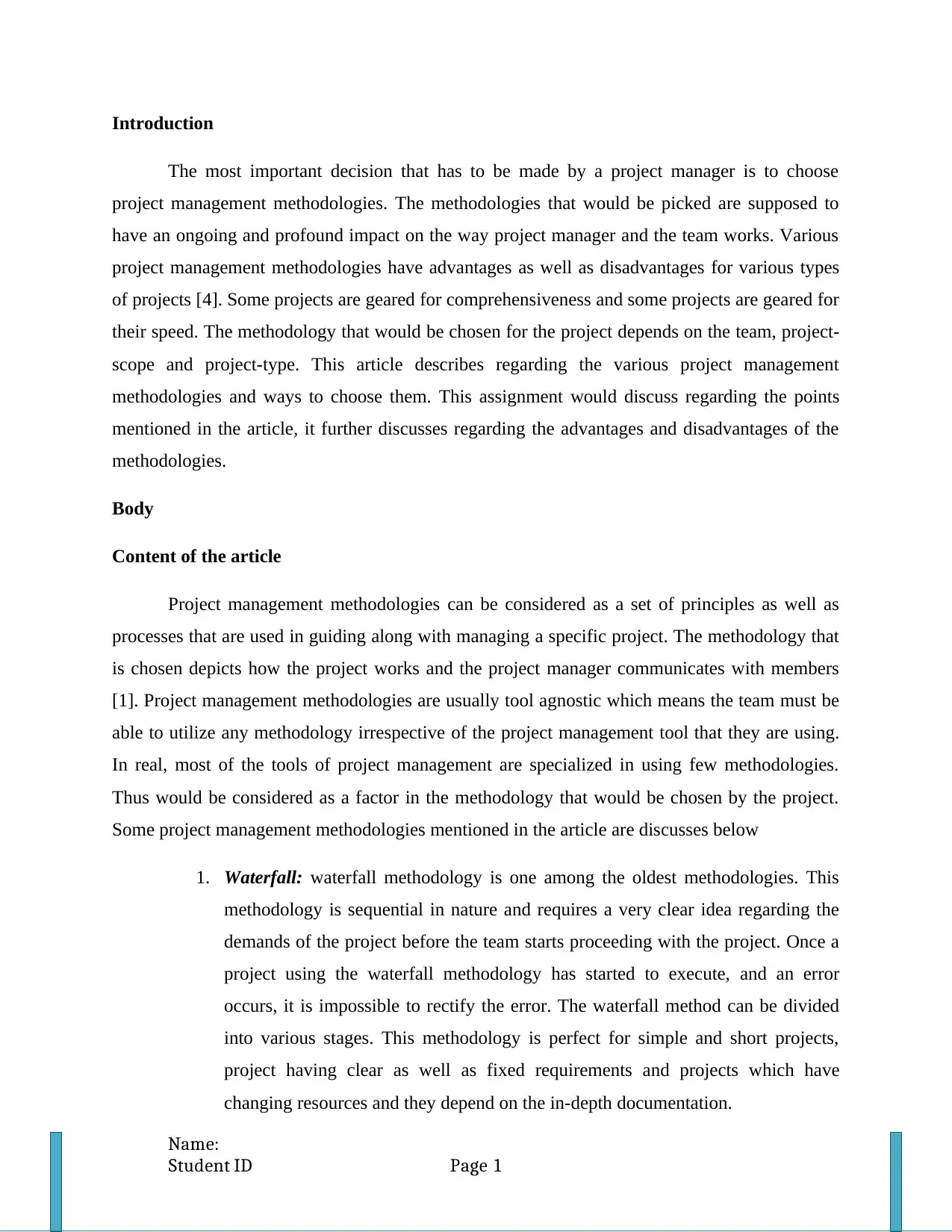
Introduction
The most important decision that has to be made by a project manager is to choose
project management methodologies. The methodologies that would be picked are supposed to
have an ongoing and profound impact on the way project manager and the team works. Various
project management methodologies have advantages as well as disadvantages for various types
of projects [4]. Some projects are geared for comprehensiveness and some projects are geared for
their speed. The methodology that would be chosen for the project depends on the team, project-
scope and project-type. This article describes regarding the various project management
methodologies and ways to choose them. This assignment would discuss regarding the points
mentioned in the article, it further discusses regarding the advantages and disadvantages of the
methodologies.
Body
Content of the article
Project management methodologies can be considered as a set of principles as well as
processes that are used in guiding along with managing a specific project. The methodology that
is chosen depicts how the project works and the project manager communicates with members
[1]. Project management methodologies are usually tool agnostic which means the team must be
able to utilize any methodology irrespective of the project management tool that they are using.
In real, most of the tools of project management are specialized in using few methodologies.
Thus would be considered as a factor in the methodology that would be chosen by the project.
Some project management methodologies mentioned in the article are discusses below
1. Waterfall: waterfall methodology is one among the oldest methodologies. This
methodology is sequential in nature and requires a very clear idea regarding the
demands of the project before the team starts proceeding with the project. Once a
project using the waterfall methodology has started to execute, and an error
occurs, it is impossible to rectify the error. The waterfall method can be divided
into various stages. This methodology is perfect for simple and short projects,
project having clear as well as fixed requirements and projects which have
changing resources and they depend on the in-depth documentation.
Name:
Student ID Page 1
The most important decision that has to be made by a project manager is to choose
project management methodologies. The methodologies that would be picked are supposed to
have an ongoing and profound impact on the way project manager and the team works. Various
project management methodologies have advantages as well as disadvantages for various types
of projects [4]. Some projects are geared for comprehensiveness and some projects are geared for
their speed. The methodology that would be chosen for the project depends on the team, project-
scope and project-type. This article describes regarding the various project management
methodologies and ways to choose them. This assignment would discuss regarding the points
mentioned in the article, it further discusses regarding the advantages and disadvantages of the
methodologies.
Body
Content of the article
Project management methodologies can be considered as a set of principles as well as
processes that are used in guiding along with managing a specific project. The methodology that
is chosen depicts how the project works and the project manager communicates with members
[1]. Project management methodologies are usually tool agnostic which means the team must be
able to utilize any methodology irrespective of the project management tool that they are using.
In real, most of the tools of project management are specialized in using few methodologies.
Thus would be considered as a factor in the methodology that would be chosen by the project.
Some project management methodologies mentioned in the article are discusses below
1. Waterfall: waterfall methodology is one among the oldest methodologies. This
methodology is sequential in nature and requires a very clear idea regarding the
demands of the project before the team starts proceeding with the project. Once a
project using the waterfall methodology has started to execute, and an error
occurs, it is impossible to rectify the error. The waterfall method can be divided
into various stages. This methodology is perfect for simple and short projects,
project having clear as well as fixed requirements and projects which have
changing resources and they depend on the in-depth documentation.
Name:
Student ID Page 1
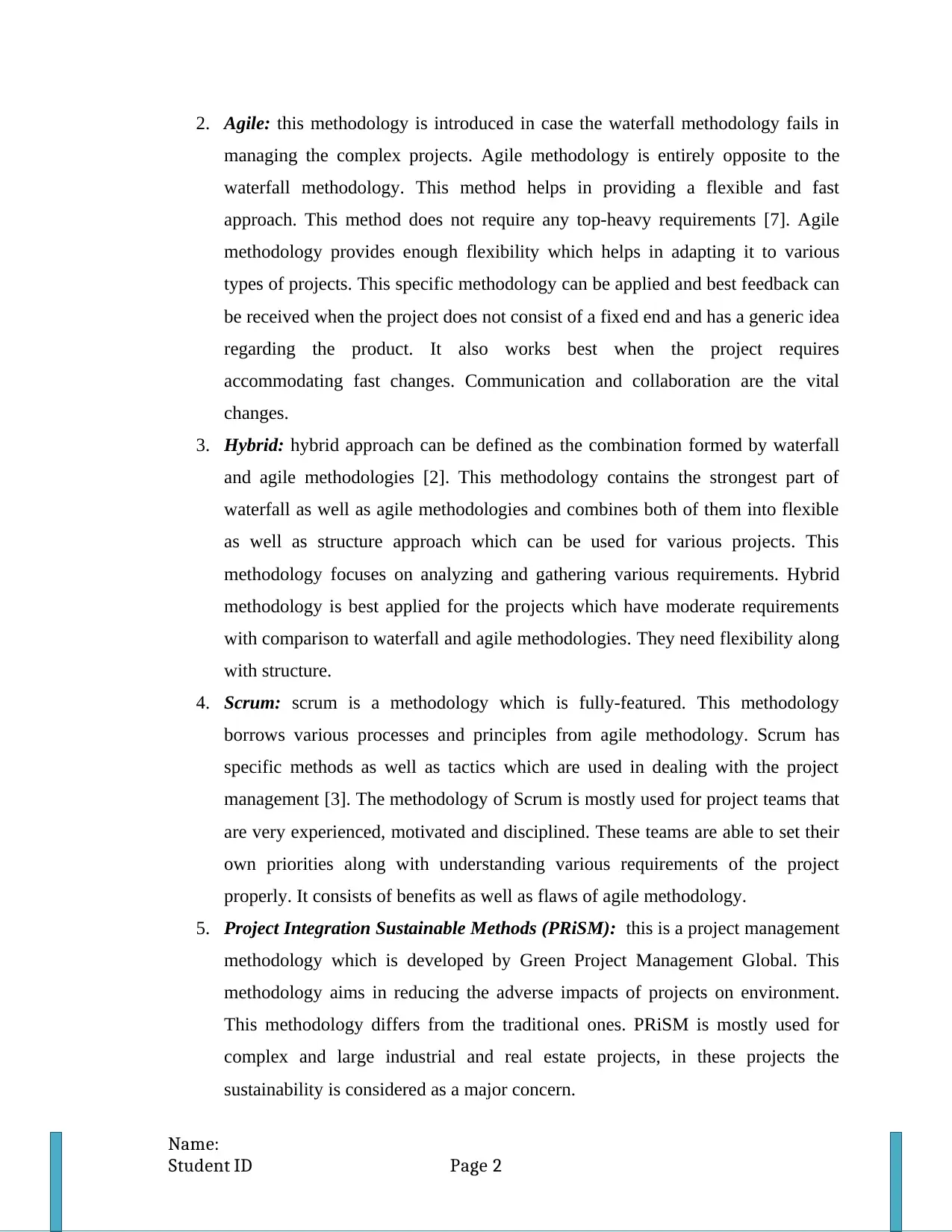
2. Agile: this methodology is introduced in case the waterfall methodology fails in
managing the complex projects. Agile methodology is entirely opposite to the
waterfall methodology. This method helps in providing a flexible and fast
approach. This method does not require any top-heavy requirements [7]. Agile
methodology provides enough flexibility which helps in adapting it to various
types of projects. This specific methodology can be applied and best feedback can
be received when the project does not consist of a fixed end and has a generic idea
regarding the product. It also works best when the project requires
accommodating fast changes. Communication and collaboration are the vital
changes.
3. Hybrid: hybrid approach can be defined as the combination formed by waterfall
and agile methodologies [2]. This methodology contains the strongest part of
waterfall as well as agile methodologies and combines both of them into flexible
as well as structure approach which can be used for various projects. This
methodology focuses on analyzing and gathering various requirements. Hybrid
methodology is best applied for the projects which have moderate requirements
with comparison to waterfall and agile methodologies. They need flexibility along
with structure.
4. Scrum: scrum is a methodology which is fully-featured. This methodology
borrows various processes and principles from agile methodology. Scrum has
specific methods as well as tactics which are used in dealing with the project
management [3]. The methodology of Scrum is mostly used for project teams that
are very experienced, motivated and disciplined. These teams are able to set their
own priorities along with understanding various requirements of the project
properly. It consists of benefits as well as flaws of agile methodology.
5. Project Integration Sustainable Methods (PRiSM): this is a project management
methodology which is developed by Green Project Management Global. This
methodology aims in reducing the adverse impacts of projects on environment.
This methodology differs from the traditional ones. PRiSM is mostly used for
complex and large industrial and real estate projects, in these projects the
sustainability is considered as a major concern.
Name:
Student ID Page 2
managing the complex projects. Agile methodology is entirely opposite to the
waterfall methodology. This method helps in providing a flexible and fast
approach. This method does not require any top-heavy requirements [7]. Agile
methodology provides enough flexibility which helps in adapting it to various
types of projects. This specific methodology can be applied and best feedback can
be received when the project does not consist of a fixed end and has a generic idea
regarding the product. It also works best when the project requires
accommodating fast changes. Communication and collaboration are the vital
changes.
3. Hybrid: hybrid approach can be defined as the combination formed by waterfall
and agile methodologies [2]. This methodology contains the strongest part of
waterfall as well as agile methodologies and combines both of them into flexible
as well as structure approach which can be used for various projects. This
methodology focuses on analyzing and gathering various requirements. Hybrid
methodology is best applied for the projects which have moderate requirements
with comparison to waterfall and agile methodologies. They need flexibility along
with structure.
4. Scrum: scrum is a methodology which is fully-featured. This methodology
borrows various processes and principles from agile methodology. Scrum has
specific methods as well as tactics which are used in dealing with the project
management [3]. The methodology of Scrum is mostly used for project teams that
are very experienced, motivated and disciplined. These teams are able to set their
own priorities along with understanding various requirements of the project
properly. It consists of benefits as well as flaws of agile methodology.
5. Project Integration Sustainable Methods (PRiSM): this is a project management
methodology which is developed by Green Project Management Global. This
methodology aims in reducing the adverse impacts of projects on environment.
This methodology differs from the traditional ones. PRiSM is mostly used for
complex and large industrial and real estate projects, in these projects the
sustainability is considered as a major concern.
Name:
Student ID Page 2
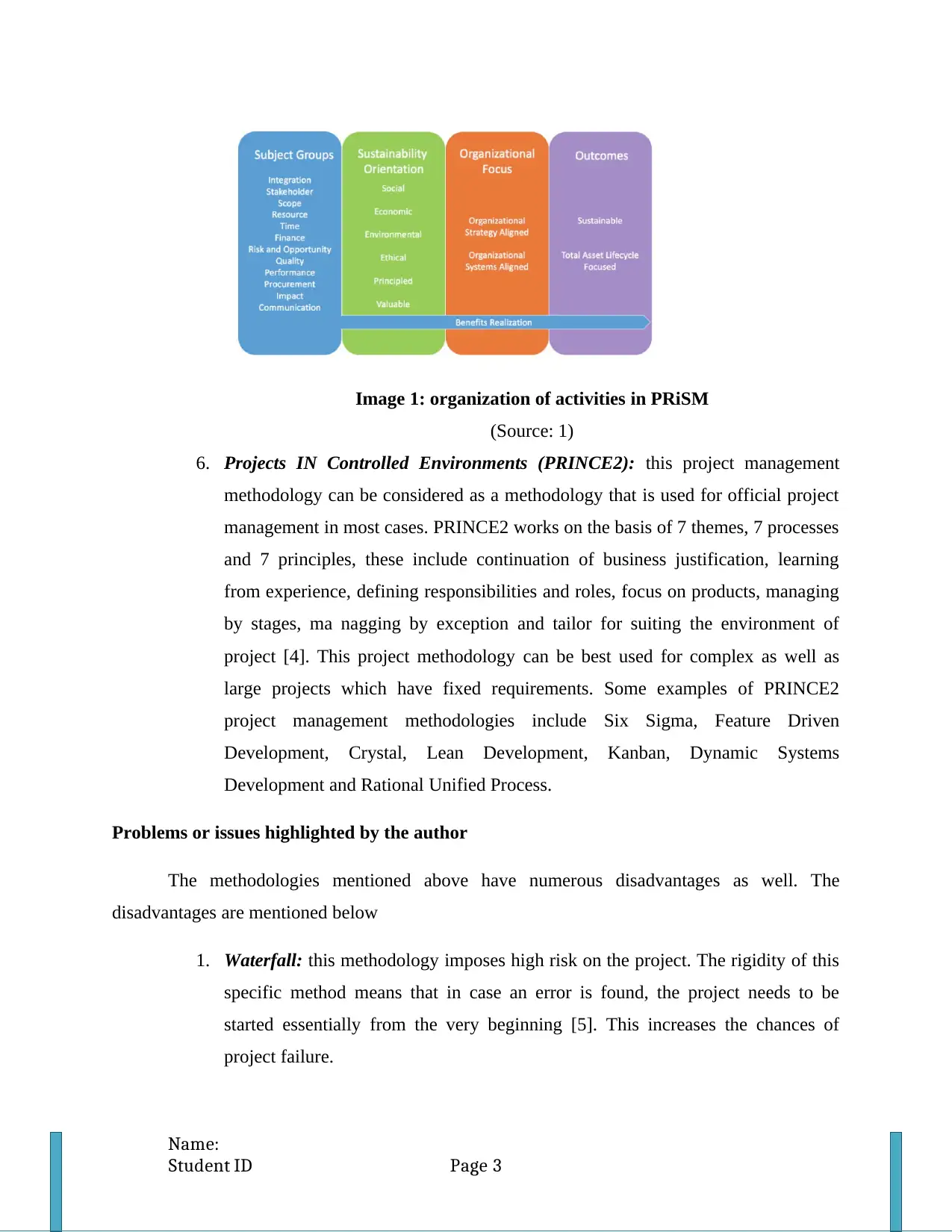
Image 1: organization of activities in PRiSM
(Source: 1)
6. Projects IN Controlled Environments (PRINCE2): this project management
methodology can be considered as a methodology that is used for official project
management in most cases. PRINCE2 works on the basis of 7 themes, 7 processes
and 7 principles, these include continuation of business justification, learning
from experience, defining responsibilities and roles, focus on products, managing
by stages, ma nagging by exception and tailor for suiting the environment of
project [4]. This project methodology can be best used for complex as well as
large projects which have fixed requirements. Some examples of PRINCE2
project management methodologies include Six Sigma, Feature Driven
Development, Crystal, Lean Development, Kanban, Dynamic Systems
Development and Rational Unified Process.
Problems or issues highlighted by the author
The methodologies mentioned above have numerous disadvantages as well. The
disadvantages are mentioned below
1. Waterfall: this methodology imposes high risk on the project. The rigidity of this
specific method means that in case an error is found, the project needs to be
started essentially from the very beginning [5]. This increases the chances of
project failure.
Name:
Student ID Page 3
(Source: 1)
6. Projects IN Controlled Environments (PRINCE2): this project management
methodology can be considered as a methodology that is used for official project
management in most cases. PRINCE2 works on the basis of 7 themes, 7 processes
and 7 principles, these include continuation of business justification, learning
from experience, defining responsibilities and roles, focus on products, managing
by stages, ma nagging by exception and tailor for suiting the environment of
project [4]. This project methodology can be best used for complex as well as
large projects which have fixed requirements. Some examples of PRINCE2
project management methodologies include Six Sigma, Feature Driven
Development, Crystal, Lean Development, Kanban, Dynamic Systems
Development and Rational Unified Process.
Problems or issues highlighted by the author
The methodologies mentioned above have numerous disadvantages as well. The
disadvantages are mentioned below
1. Waterfall: this methodology imposes high risk on the project. The rigidity of this
specific method means that in case an error is found, the project needs to be
started essentially from the very beginning [5]. This increases the chances of
project failure.
Name:
Student ID Page 3
Secure Best Marks with AI Grader
Need help grading? Try our AI Grader for instant feedback on your assignments.
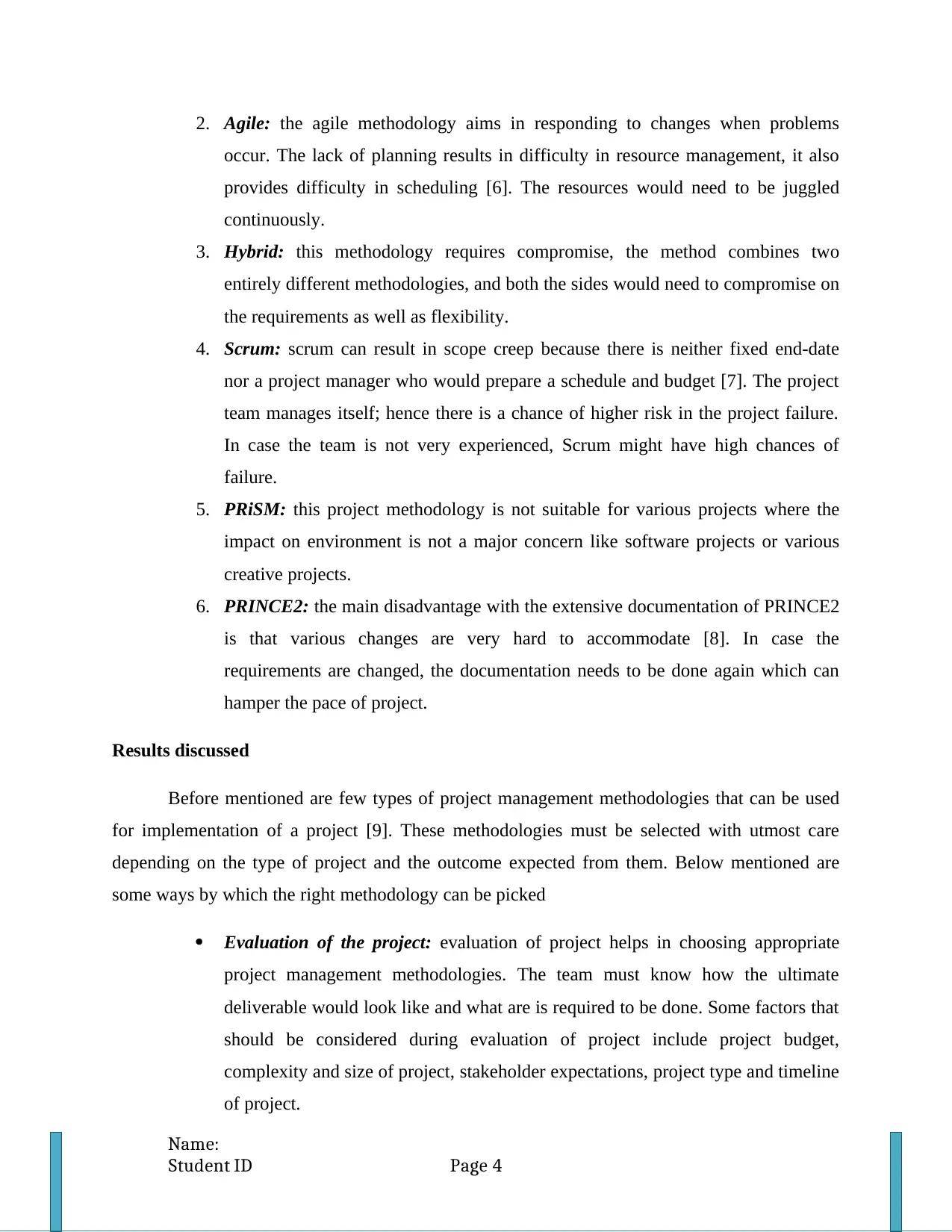
2. Agile: the agile methodology aims in responding to changes when problems
occur. The lack of planning results in difficulty in resource management, it also
provides difficulty in scheduling [6]. The resources would need to be juggled
continuously.
3. Hybrid: this methodology requires compromise, the method combines two
entirely different methodologies, and both the sides would need to compromise on
the requirements as well as flexibility.
4. Scrum: scrum can result in scope creep because there is neither fixed end-date
nor a project manager who would prepare a schedule and budget [7]. The project
team manages itself; hence there is a chance of higher risk in the project failure.
In case the team is not very experienced, Scrum might have high chances of
failure.
5. PRiSM: this project methodology is not suitable for various projects where the
impact on environment is not a major concern like software projects or various
creative projects.
6. PRINCE2: the main disadvantage with the extensive documentation of PRINCE2
is that various changes are very hard to accommodate [8]. In case the
requirements are changed, the documentation needs to be done again which can
hamper the pace of project.
Results discussed
Before mentioned are few types of project management methodologies that can be used
for implementation of a project [9]. These methodologies must be selected with utmost care
depending on the type of project and the outcome expected from them. Below mentioned are
some ways by which the right methodology can be picked
Evaluation of the project: evaluation of project helps in choosing appropriate
project management methodologies. The team must know how the ultimate
deliverable would look like and what are is required to be done. Some factors that
should be considered during evaluation of project include project budget,
complexity and size of project, stakeholder expectations, project type and timeline
of project.
Name:
Student ID Page 4
occur. The lack of planning results in difficulty in resource management, it also
provides difficulty in scheduling [6]. The resources would need to be juggled
continuously.
3. Hybrid: this methodology requires compromise, the method combines two
entirely different methodologies, and both the sides would need to compromise on
the requirements as well as flexibility.
4. Scrum: scrum can result in scope creep because there is neither fixed end-date
nor a project manager who would prepare a schedule and budget [7]. The project
team manages itself; hence there is a chance of higher risk in the project failure.
In case the team is not very experienced, Scrum might have high chances of
failure.
5. PRiSM: this project methodology is not suitable for various projects where the
impact on environment is not a major concern like software projects or various
creative projects.
6. PRINCE2: the main disadvantage with the extensive documentation of PRINCE2
is that various changes are very hard to accommodate [8]. In case the
requirements are changed, the documentation needs to be done again which can
hamper the pace of project.
Results discussed
Before mentioned are few types of project management methodologies that can be used
for implementation of a project [9]. These methodologies must be selected with utmost care
depending on the type of project and the outcome expected from them. Below mentioned are
some ways by which the right methodology can be picked
Evaluation of the project: evaluation of project helps in choosing appropriate
project management methodologies. The team must know how the ultimate
deliverable would look like and what are is required to be done. Some factors that
should be considered during evaluation of project include project budget,
complexity and size of project, stakeholder expectations, project type and timeline
of project.
Name:
Student ID Page 4
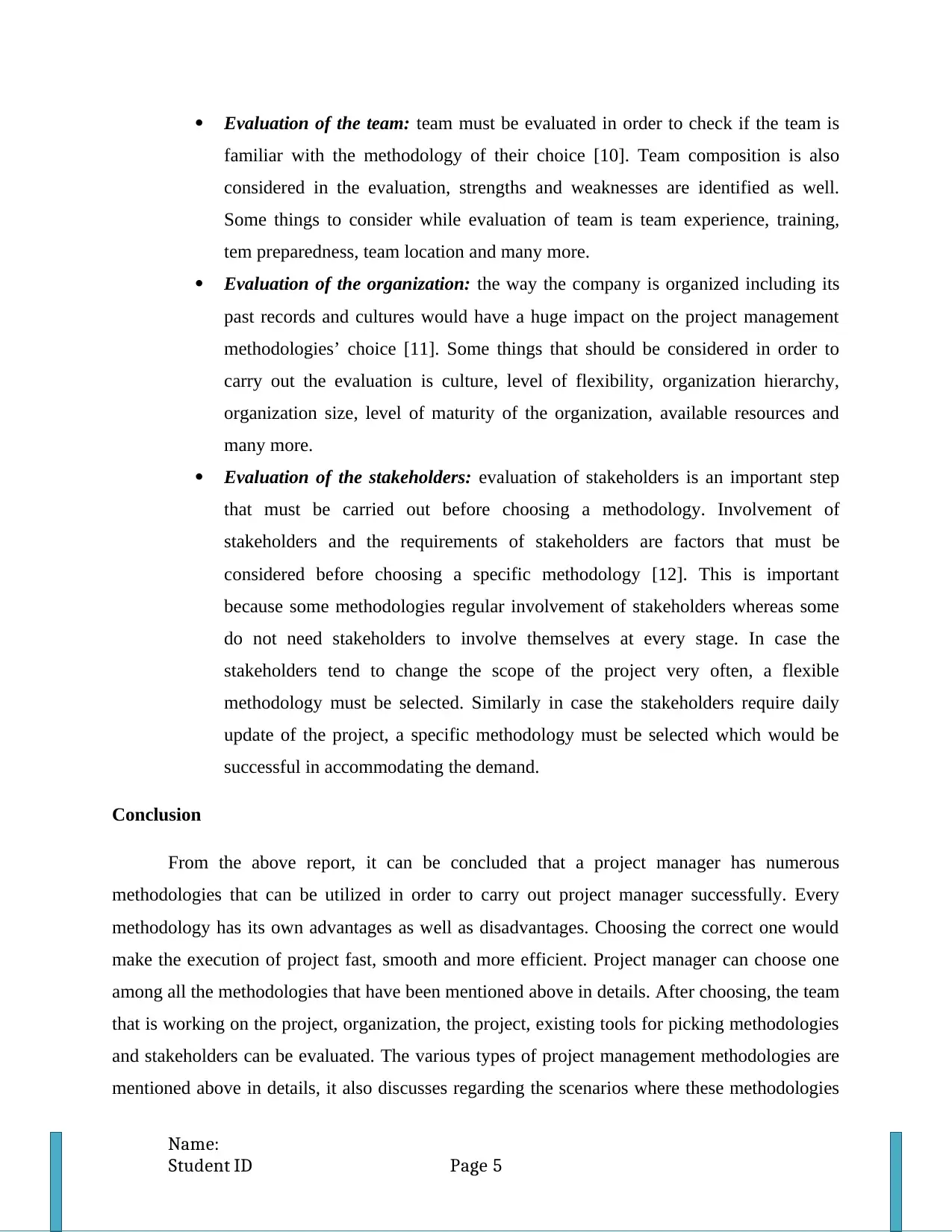
Evaluation of the team: team must be evaluated in order to check if the team is
familiar with the methodology of their choice [10]. Team composition is also
considered in the evaluation, strengths and weaknesses are identified as well.
Some things to consider while evaluation of team is team experience, training,
tem preparedness, team location and many more.
Evaluation of the organization: the way the company is organized including its
past records and cultures would have a huge impact on the project management
methodologies’ choice [11]. Some things that should be considered in order to
carry out the evaluation is culture, level of flexibility, organization hierarchy,
organization size, level of maturity of the organization, available resources and
many more.
Evaluation of the stakeholders: evaluation of stakeholders is an important step
that must be carried out before choosing a methodology. Involvement of
stakeholders and the requirements of stakeholders are factors that must be
considered before choosing a specific methodology [12]. This is important
because some methodologies regular involvement of stakeholders whereas some
do not need stakeholders to involve themselves at every stage. In case the
stakeholders tend to change the scope of the project very often, a flexible
methodology must be selected. Similarly in case the stakeholders require daily
update of the project, a specific methodology must be selected which would be
successful in accommodating the demand.
Conclusion
From the above report, it can be concluded that a project manager has numerous
methodologies that can be utilized in order to carry out project manager successfully. Every
methodology has its own advantages as well as disadvantages. Choosing the correct one would
make the execution of project fast, smooth and more efficient. Project manager can choose one
among all the methodologies that have been mentioned above in details. After choosing, the team
that is working on the project, organization, the project, existing tools for picking methodologies
and stakeholders can be evaluated. The various types of project management methodologies are
mentioned above in details, it also discusses regarding the scenarios where these methodologies
Name:
Student ID Page 5
familiar with the methodology of their choice [10]. Team composition is also
considered in the evaluation, strengths and weaknesses are identified as well.
Some things to consider while evaluation of team is team experience, training,
tem preparedness, team location and many more.
Evaluation of the organization: the way the company is organized including its
past records and cultures would have a huge impact on the project management
methodologies’ choice [11]. Some things that should be considered in order to
carry out the evaluation is culture, level of flexibility, organization hierarchy,
organization size, level of maturity of the organization, available resources and
many more.
Evaluation of the stakeholders: evaluation of stakeholders is an important step
that must be carried out before choosing a methodology. Involvement of
stakeholders and the requirements of stakeholders are factors that must be
considered before choosing a specific methodology [12]. This is important
because some methodologies regular involvement of stakeholders whereas some
do not need stakeholders to involve themselves at every stage. In case the
stakeholders tend to change the scope of the project very often, a flexible
methodology must be selected. Similarly in case the stakeholders require daily
update of the project, a specific methodology must be selected which would be
successful in accommodating the demand.
Conclusion
From the above report, it can be concluded that a project manager has numerous
methodologies that can be utilized in order to carry out project manager successfully. Every
methodology has its own advantages as well as disadvantages. Choosing the correct one would
make the execution of project fast, smooth and more efficient. Project manager can choose one
among all the methodologies that have been mentioned above in details. After choosing, the team
that is working on the project, organization, the project, existing tools for picking methodologies
and stakeholders can be evaluated. The various types of project management methodologies are
mentioned above in details, it also discusses regarding the scenarios where these methodologies
Name:
Student ID Page 5

can be used for effective result and the disadvantages of the methodologies have also been
mentioned in the report.
Name:
Student ID Page 6
mentioned in the report.
Name:
Student ID Page 6
Paraphrase This Document
Need a fresh take? Get an instant paraphrase of this document with our AI Paraphraser
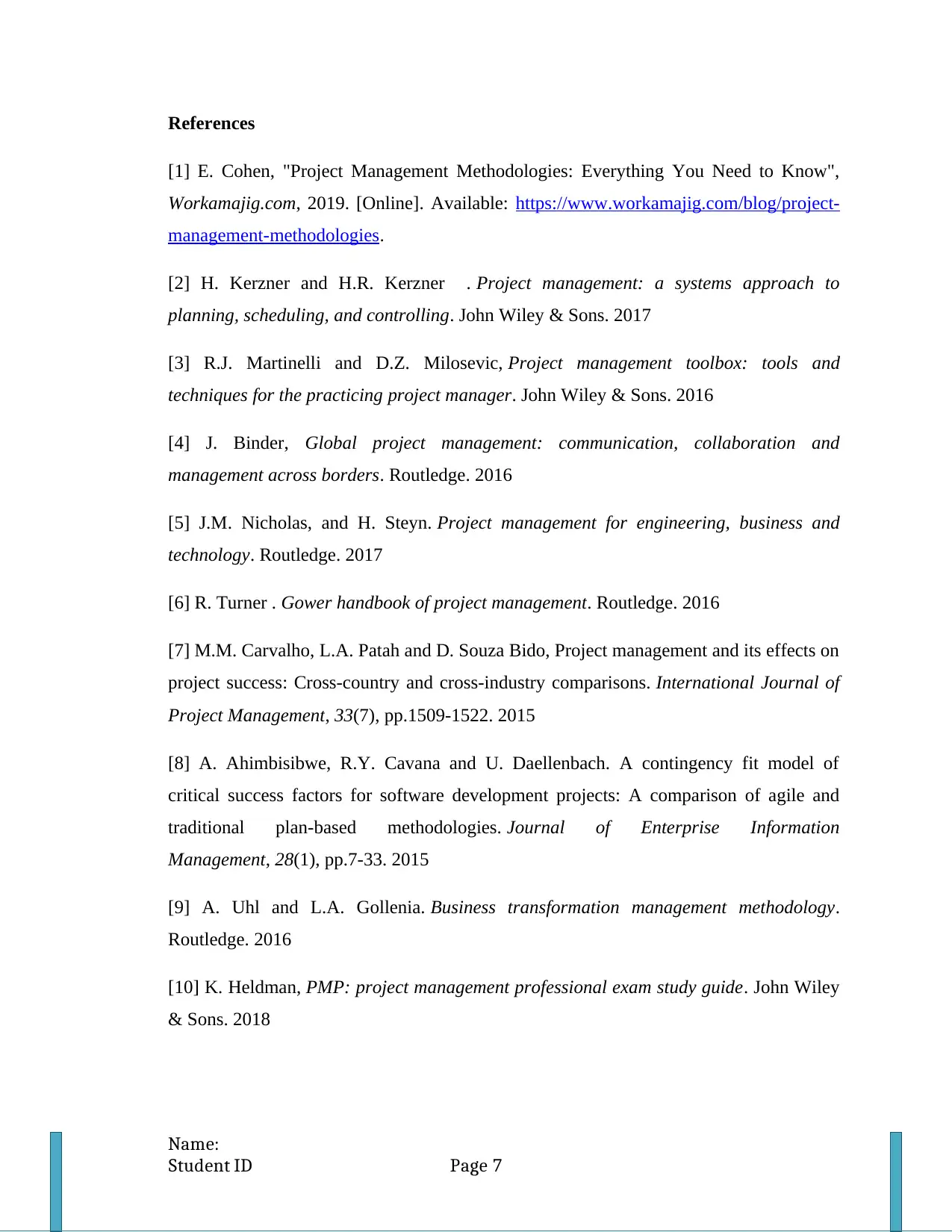
References
[1] E. Cohen, "Project Management Methodologies: Everything You Need to Know",
Workamajig.com, 2019. [Online]. Available: https://www.workamajig.com/blog/project-
management-methodologies.
[2] H. Kerzner and H.R. Kerzner . Project management: a systems approach to
planning, scheduling, and controlling. John Wiley & Sons. 2017
[3] R.J. Martinelli and D.Z. Milosevic, Project management toolbox: tools and
techniques for the practicing project manager. John Wiley & Sons. 2016
[4] J. Binder, Global project management: communication, collaboration and
management across borders. Routledge. 2016
[5] J.M. Nicholas, and H. Steyn. Project management for engineering, business and
technology. Routledge. 2017
[6] R. Turner . Gower handbook of project management. Routledge. 2016
[7] M.M. Carvalho, L.A. Patah and D. Souza Bido, Project management and its effects on
project success: Cross-country and cross-industry comparisons. International Journal of
Project Management, 33(7), pp.1509-1522. 2015
[8] A. Ahimbisibwe, R.Y. Cavana and U. Daellenbach. A contingency fit model of
critical success factors for software development projects: A comparison of agile and
traditional plan-based methodologies. Journal of Enterprise Information
Management, 28(1), pp.7-33. 2015
[9] A. Uhl and L.A. Gollenia. Business transformation management methodology.
Routledge. 2016
[10] K. Heldman, PMP: project management professional exam study guide. John Wiley
& Sons. 2018
Name:
Student ID Page 7
[1] E. Cohen, "Project Management Methodologies: Everything You Need to Know",
Workamajig.com, 2019. [Online]. Available: https://www.workamajig.com/blog/project-
management-methodologies.
[2] H. Kerzner and H.R. Kerzner . Project management: a systems approach to
planning, scheduling, and controlling. John Wiley & Sons. 2017
[3] R.J. Martinelli and D.Z. Milosevic, Project management toolbox: tools and
techniques for the practicing project manager. John Wiley & Sons. 2016
[4] J. Binder, Global project management: communication, collaboration and
management across borders. Routledge. 2016
[5] J.M. Nicholas, and H. Steyn. Project management for engineering, business and
technology. Routledge. 2017
[6] R. Turner . Gower handbook of project management. Routledge. 2016
[7] M.M. Carvalho, L.A. Patah and D. Souza Bido, Project management and its effects on
project success: Cross-country and cross-industry comparisons. International Journal of
Project Management, 33(7), pp.1509-1522. 2015
[8] A. Ahimbisibwe, R.Y. Cavana and U. Daellenbach. A contingency fit model of
critical success factors for software development projects: A comparison of agile and
traditional plan-based methodologies. Journal of Enterprise Information
Management, 28(1), pp.7-33. 2015
[9] A. Uhl and L.A. Gollenia. Business transformation management methodology.
Routledge. 2016
[10] K. Heldman, PMP: project management professional exam study guide. John Wiley
& Sons. 2018
Name:
Student ID Page 7
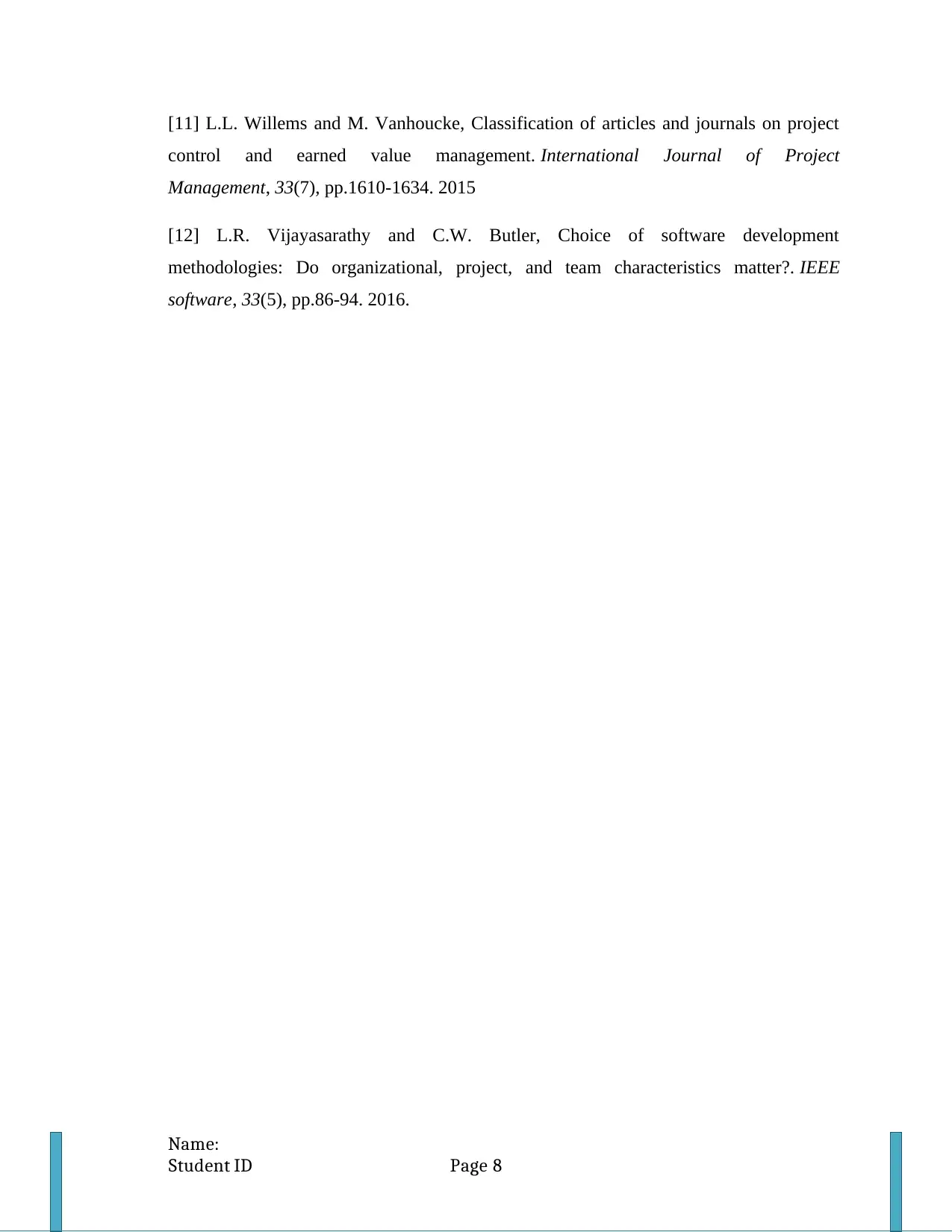
[11] L.L. Willems and M. Vanhoucke, Classification of articles and journals on project
control and earned value management. International Journal of Project
Management, 33(7), pp.1610-1634. 2015
[12] L.R. Vijayasarathy and C.W. Butler, Choice of software development
methodologies: Do organizational, project, and team characteristics matter?. IEEE
software, 33(5), pp.86-94. 2016.
Name:
Student ID Page 8
control and earned value management. International Journal of Project
Management, 33(7), pp.1610-1634. 2015
[12] L.R. Vijayasarathy and C.W. Butler, Choice of software development
methodologies: Do organizational, project, and team characteristics matter?. IEEE
software, 33(5), pp.86-94. 2016.
Name:
Student ID Page 8
1 out of 9
Related Documents
Your All-in-One AI-Powered Toolkit for Academic Success.
+13062052269
info@desklib.com
Available 24*7 on WhatsApp / Email
![[object Object]](/_next/static/media/star-bottom.7253800d.svg)
Unlock your academic potential
© 2024 | Zucol Services PVT LTD | All rights reserved.




